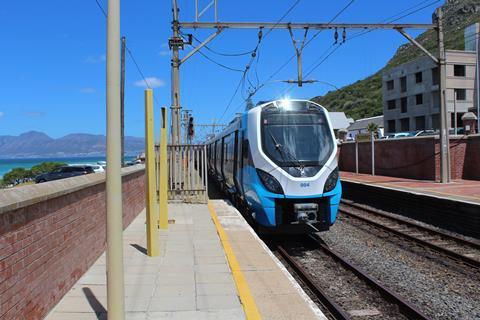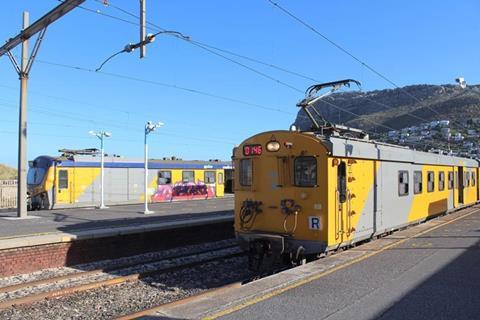
SOUTH AFRICA: Following months of negotiations, the city of Cape Town and Passenger Rail Agency of South Africa signed a Service Level Plan on December 4 which Mayor Geordin Hill-Lewis said would ‘lay the foundation for future rail devolution’.
The SLP is intended to ensure regular, accurate progress reporting from Prasa about the delivery of suburban rail services in Western Cape. The city will exercise oversight over the annual performance plan commitments to revitalise stations, introduce more trainsets, recommission more services and improve the number of daily passengers and services operated.
‘This is a big step towards improving the quality and reliability of the service through a legally binding agreement, and I am very pleased that we managed to get this finalised this year’, Hill-Lewis said.
Three models for devolution
The city council approved the Rail Feasibility Study on the same day. Launched in July 2022, the study investigated the impact and implications of passenger rail services being devolved from the government to Cape Town city council.
The municipality is now developing business plans for completion by mid-2025 for three ownership models:
- the city owns, operates and maintains the rail network, stations and trains, and it takes on existing Prasa personnel;
- the city owns all rail related assets and issues concessions to manage the rail network, stations and responsibility for all train operations and maintenance. The concessionaire absorbs Prasa personnel;
- the city procures a large-scale integrated package through a comprehensive concession.
City hall officials believe that if the local authority were in control of rail services, it would ensure a fully functional and efficient service in line with the city’s constitutional mandate of providing an integrated public transport system.
‘We have a vision to massively scale up passenger numbers, new trainsets, new routes, and to upgrade stations and surrounding areas with affordable housing over the next two decades’, Hill-Lewis explained.

‘Once complete, the business plans will give us further clarity on the required capital injections to replace dated assets and expand the rail network. Expansion is critical as we have to plan ahead for a growing population — be it to increase capacity on the lines where the demand is high, such as the route between Strand and Bellville, or to expand the service to areas where there are currently no trains at all, such as the implementation of the Blue Downs line’, said Rob Quintas, Councillor on the city’s Mayoral Committee for Urban Mobility.
The city estimates the cost of devolution, considering inflation, over a 30-year period at R123bn, for which it would require a subsidy from the government as well as a ‘significant private sector investment into passenger rail’.
Government not keen
Unlike Cape Town Mayor Geordin Hill-Lewis, the national government has so far been reluctant to support the rail devolution.
However, in April 2022, Minister of Finance Enoch Godongwana authorised Cape Town officials to undertake a feasibility study for the devolution, while Minister of Transport Sindisiwe Chikunga said in May 2023 that ‘for now we are not in the process of devolving railway services’. She added that passenger rail devolution is in South Africa’s rail policy, ‘but there are conditions to it’.
In July, Barbara Creecy, who was appointed as Minister of Transport in the same month, said in parliament that ‘the question we have to look at is the affordability and what we don’t need in this country is nine Prasas. We will have to look at practicalities [and] affordability. I’m told that internationally, it’s not normal to devolve railway practices.’

















